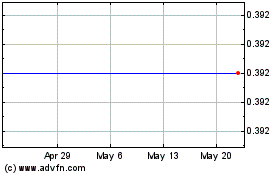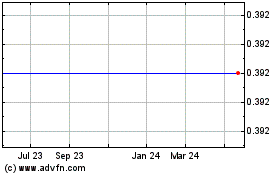Chaparral Energy Files for Bankruptcy, Again -- Update
August 17 2020 - 2:22PM
Dow Jones News
By Colin Kellaher and Patrick Fitzgerald
Chaparral Energy Inc. filed for chapter 11 protection, its
second trip into bankruptcy in less than four years, joining a slew
of oil-and-gas drillers undone by low commodity prices and the
economic downturn sparked by efforts to contain the coronavirus
pandemic.
The Oklahoma City company filed for chapter 11 Sunday in U.S.
Bankruptcy Court in Wilmington, Del., after reaching a
restructuring support agreement on a $300 million debt-for-equity
swap with bondholders.
More than two-thirds of its lenders and bondholders have signed
off on the prepackaged reorganization plan, which calls for lenders
to provide $175 million in a reserves-based exit facility and a
fully backstopped $35 million new-money convertible-note rights
offering. The company's existing reserves-based lenders will be
paid in full, about $190 million, in cash and new debt. Chaparral's
bondholders will see an estimated recovery of 15% to 47% under the
debt-for-equity swap, according to an outline of the plan filed
with the court.
Chaparral said the plan would also bolster its liquidity
position.
Like other drillers based in the oil patch, Chaparral has been
bludgeoned by the twin blows of volatile oil-and-gas pricing caused
by the price war between Russia and Saudi Arabia earlier this year
along with a sudden drop in energy demand brought on by the
coronavirus pandemic. Among the fallen are shale-drilling pioneer
Chesapeake Energy Corp., which filed for bankruptcy in June, and
Denbury Resources Inc., which filed for bankruptcy the following
month. Houston-based offshore driller Fieldwood Energy LLC filed
for the second time in as many years earlier this month and Austin,
Texas-based Remora Petroleum LP filed for bankruptcy last week.
"While we have taken carefully measured and decisive action to
address the challenges of 2020, the overall impact to the energy
industry, including Chaparral, has been severe," Chief Executive
Chuck Duginski said Monday.
The Oklahoma City company drew down on its revolving credit line
in April as it sought to shore up its cash reserves to weather the
collapse in oil prices and disruptions caused by the
coronavirus.
As of Friday, Chaparral had $32 million in cash, which combined
with its normal operating cash flow is enough to allow the company
to continue operating pending approval of its prepackaged
restructuring plan.
Prepackaged plans, in which a sufficient number of creditors
have already voted to approve a deal, have become increasingly
popular with companies looking to reduce the time and expense spent
in the chapter 11 process.
Trading in shares of Chaparral, which closed Friday at 39.2
cents, was halted premarket Monday. The company said its existing
shares have no value and will be canceled without any distribution
upon the company's exit from bankruptcy.
Chaparral also filed for bankruptcy in 2016 after oil prices
crashed, one in a wave of oil-and-gas companies to do so. The
company emerged from bankruptcy the following year, handing
ownership to its bondholders.
The company's bankruptcy advisers include law firm Davis, Polk
& Wardwell LLP; investment banks Rothschild & Co. and
Intrepid Partners LLC; and financial adviser Opportune LLP. Law
firm Sidley Austin LLP is advising Chaparral's board.
The case number is 20-11947.
Write to Colin Kellaher at colin.kellaher@wsj.com and Patrick
Fitzgerald at patrick.fitzgerald@wsj.com
(END) Dow Jones Newswires
August 17, 2020 14:07 ET (18:07 GMT)
Copyright (c) 2020 Dow Jones & Company, Inc.
Chaparral Energy (NYSE:CHAP)
Historical Stock Chart
From Nov 2024 to Dec 2024

Chaparral Energy (NYSE:CHAP)
Historical Stock Chart
From Dec 2023 to Dec 2024
